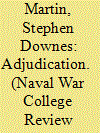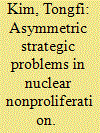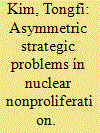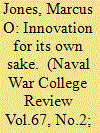|
|
|
Sort Order |
|
|
|
Items / Page
|
|
|
|
|
|
|
| Srl | Item |
| 1 |
ID:
133382


|
|
|
|
|
| Publication |
2014.
|
| Summary/Abstract |
Commonly used war-game adjudication methods break down and create unreliable results when addressing novel operational or strategic problems for which we have little experience or data (for example, information warfare or a regional nuclear conflict) and when we wish to explore situations rather than educate officers about well-understood situations. The primary causes of this breakdown are, first, the incorrect assumption that adjudicators are impartial controllers instead of dominant players and, second, the design choice to make the players' decisions the game's primary output. Among the many reasons for war gaming (such as research and analysis, training, education, and discovery), this article focuses on "discovery" war games, where the objective is to find out something previously unknown about a novel operational or strategic problem, something that cannot be better discovered by other methods, such as seminars, work groups, modeling and simulation, or operations research.
|
|
|
|
|
|
|
|
|
|
|
|
|
|
|
|
| 2 |
ID:
137299


|
|
|
|
|
| Summary/Abstract |
This article explains cooperation problems between powerful democratic states and weak non-democratic states in the context of nuclear nonproliferation. Focusing on the interactions of the United States with North Korea, Iran, and Libya, it suggests that power asymmetry and information asymmetry foster mutual distrust by exacerbating two main strategic obstacles to cooperation: the time inconsistency of the stronger state's policy and the incomplete information regarding the non-democratic states. The nature of negotiations over nuclear weapons programs further exacerbates these problems. The overall implications of this article leave us pessimistic about the possibility of negotiated nuclear disarmament, but the theoretical analysis may help the negotiation strategy of the United States.
|
|
|
|
|
|
|
|
|
|
|
|
|
|
|
|
| 3 |
ID:
138093


|
|
|
|
|
| Summary/Abstract |
This article explains cooperation problems between powerful democratic states and weak non-democratic states in the context of nuclear nonproliferation. Focusing on the interactions of the United States with North Korea, Iran, and Libya, it suggests that power asymmetry and information asymmetry foster mutual distrust by exacerbating two main strategic obstacles to cooperation: the time inconsistency of the stronger state’s policy and the incomplete information regarding the nondemocratic states. The nature of negotiations over nuclear weapons programs further exacerbates these problems. The overall implications of this article leave us pessimistic about the possibility of negotiated nuclear disarmament, but the theoretical analysis may help the negotiation strategy of the United States.
|
|
|
|
|
|
|
|
|
|
|
|
|
|
|
|
| 4 |
ID:
133073


|
|
|
|
|
| Publication |
2014.
|
| Summary/Abstract |
The origins of this article lie in a new study of the Nazi German economy by Adam Tooze, a fragment of which argues that the need to overcome the technological deficit built by the Western Allies in antisubmarine warfare from 1939 triggered a major shift in U-boat design and production after 1943.1 Tooze points out that an emphasis on technological solutions to strategic and operational problems had by that point become a hallmark of the Nazis', and especially Hitler's, thinking. (Other examples were the Tiger and Panther tanks at Kursk, both of which types proved dysfunctional as platforms, and neither of which proved decisive to the outcome.) So interpreted, the Nazi penchant for imputing to innovation the means to solve a whole class of operational and strategic problems seems to resemble "technological fixes" in other fields of innovation.2 In so arguing Tooze writes off the findings of Richard Overy, who points to the failure of the regime to develop positive relationships between industry and the war effort as reflecting a "peculiar irrationality of the 'Nazi social system.'" Tooze highlights the research of Ralf Schabel on jet-engine development in the aircraft industry, research asserting that exaggerated technological expectations resulted from Germany's hopeless strategic dilemma and that the systems themselves, while quite promising, were rushed into mass production and combat without adequate testing or development. Interestingly, he then characterizes Admiral Karl Dönitz's decision to embrace the Type XXI submarine in 1943, under the technocratic direction of Albert Speer's ministry, as reflecting both the increasing unreality of German armaments propaganda and a progressively more authoritarian cast of the German war economy.
|
|
|
|
|
|
|
|
|
|
|
|
|
|
|
|
|
|
|
|
|